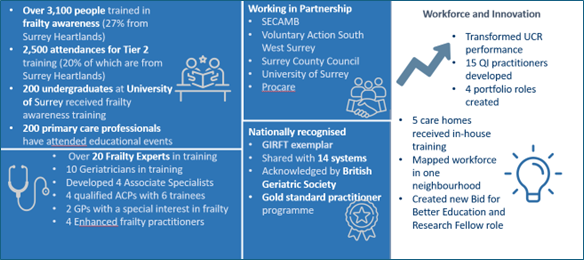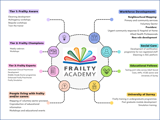The Frailty Academy: A System Wide Education and Workforce Development Programme
Introduction
Older people with frailty are often exposed to avoidable harm, including fragmented care, poorly coordinated discharge, and unnecessary hospital admissions. Despite over 50% of health and care spend being allocated to the over-65s, frailty training is not routinely provided. This results in widespread gaps in knowledge and skills, alongside a shortage of clinical experts to lead multidisciplinary teams and deliver safe, high-quality frailty care.
The Frailty Academy was established as a workforce development solution to this patient safety challenge. Its ambition is not only to train individuals but to drive system-wide improvements in safety, experience, and outcomes by transforming workforce culture and capability. It set out to embed a shared understanding of frailty and equip staff across the system with the confidence and tools to respond effectively.
The Frailty Academy is a system-wide education and training initiative designed to equip the health and care workforce with the knowledge, skills, and confidence to deliver safe, person-centred care for people living with frailty (see Figure 1). Developed within Surrey Heartlands ICS, it offers a tiered framework of learning, from basic awareness to advanced clinical expertise. Over 6,000 staff have engaged with the programme, contributing to measurable improvements in patient safety and outcomes. The Academy has been recognised nationally as an exemplar model for education and training in frailty care and replication of its framework has the potential for scalable change across the NHS.
Methods
The Academy is grounded in the Skills for Health Frailty Core Capabilities Framework and was co-designed with clinicians, educators, social care, and voluntary sector partners (VSCE).
There are four key pillars to the work of the Academy:
Pillar 1: Education:
- Tier 1: Frailty awareness for all staff and community members is delivered via:
- E-learning module on acute and community statutory and mandatory platform.
- E-learning in the Ambulance Trust.
- E-learning in Surrey wide Adult Social care.
- Tier 1 monthly workshops.
- Development of bespoke tier 1 education co-produced with the VSCE workshops.
- Tier 1 train the trainer scheme to scale delivery.
- Embedded in undergraduate courses for Paramedics, Nursing, Physician Assistants and Allied Healthcare Professionals.
- Tier 2: Frailty knowledge and skills for all frontline staff looking after older people with frailty:
- A frailty champions programme delivered by four monthly rolling weekly webinar programme, free to all across Surrey Heartlands.
- 2 day Frailty for Professionals course accredited by the Royal College of Physicians.
Pillar 2: Training
- Tier 3: Expert knowledge and skills in managing older people living with frailty is delivered by:
- Training programme for Advanced Clinical Practitioners (ACPs).
- Internal rotational training programme for Specialty Doctors towards portfolio application or Associate Specialist grade.
Pillar 3: Workforce Innovation
- Educational Fellow roles:
-
- Created for an Allied Health Professional, an Adult Social Care practitioner, and a joint employee with the Voluntary Sector.
- Educational fellows develop frailty, leadership, and quality improvement skills while testing new portfolio role models.
- They have led projects focused on unregistered carers, voluntary sector training, and integration of therapies across the frailty pathway.
- Enhanced Clinical Practitioners:
-
- A new role developed for Band 7 nurses and AHPs not wishing to enrol on an MSc pathway towards advanced Clinical Practice.
- One year training programme developed aligned to Tier 3 core capabilities and the core capabilities for UCR and Virtual Frailty Wards.
Pillar 4: Research
-
- Collaboration with the University of Surrey
Results/ Outcome
The Frailty Academy has contributed to significant, measurable improvements in patient safety, workforce capability, and system performance (see Infographic 1). Identification of frailty, understanding and management of frailty have all improved within the system leading to enhanced safe effective care through use of Comprehensive Geriatric Assessment (CGA).
System-wide impact includes:
- 22% reduction in hospital length of stay for older people.
- 59% reduction in older patients outlying in surgical beds.
- 45% reduction in 30-day readmissions for over-85s.
- Urgent Community Response (UCR) response within 2 hours improved from 40% to 82%.
Education impact:
- Over 6,000 staff trained, including:
- 3,105 individuals at Tier 1 (including 2,620 via e-learning and 235 undergraduate students).
- 2,500 webinar attendances at Tier 2.
- 10 ACPs trained through the Tier 3 frailty expert programme.
- 10 Specialty Doctors trained on the pathway to becoming a Consultant Geriatrician.
83% of Tier 1 workshop participants reported significant improvement in knowledge. Among university cohorts, 79% of paramedic students and 90% of nursing students reported increased skills and understanding.
A key milestone was the two-day Level 2 Frailty for Professionals training in April 2025. This brought together GPs, nurses, AHPs, hospital doctors, and paramedics. Feedback showed:
- 100% of participants improved their understanding.
- Every session was rated “Excellent” or “Very Good”.
- Participants described the training as “the most useful I’ve attended this year” and committed to implementing CGA, frailty scoring, deprescribing, and home-based care planning.
Qualitative outcomes include:
- A shift in culture, with participants more confident to raise concerns and lead changes in their services.
- Staff committed to applying learning in practice, from CGA in care homes to ReSPECT form conversations in primary care.
- Multidisciplinary collaboration enhanced, reducing siloed working and promoting holistic care.
Innovation:
- Expansion of tier 3 trained workforce capable of leading teams to deliver CGA at scale.
- New roles have been developed, including frailty-specific ACPs, Enhanced Practitioners, and GPs with frailty expertise.
- Fellows supported transformation in frailty pathways, integrating education with service improvement.
The Academy’s outcomes go beyond training attendance – it is embedding a new standard of frailty care, where safety is proactive, shared, and person-centred.

Infographic 1. The Frailty Academy’s achievements
Conclusion
By embedding training into the wider workforce system, the Academy ensures value is sustained long-term — not just as a series of courses, but as a movement to transform frailty care across the NHS.
The Frailty Academy is co-designed with clinicians, educators, social care, the voluntary sector, and people with lived experience through a system wide Frailty Strategy. Training is co-delivered with system partners including carers associations, voluntary sector and dementia specialists. Governed by a multi-agency steering group, including University representation and supported by Local Faculty Groups to oversee quality and delivery. The Academy provides a blueprint for delivery of system wide education, training and workforce development that could be replicated in the wider NHS.
The Frailty Academy is already acknowledged as an exemplar frailty educational programme by GIRFT and the National Clinical Director for Older People. University lecturers have described the ACP development programme as “the best they have seen in practice”. Its’ work has already been shared across many healthcare systems, but it could do more to expand and scale its’ offer to the wider NHS.
The Academy will be leading frailty education at an ICB level in Surry Heartlands as part of the Whole System Frailty Network. The Academy will look to develop innovative workforce solutions for difficult to recruit to roles in older peoples care, including the care sector and AHPs. It will work with system partners to map the workforce against the needs of an ageing population. Education for people living with frailty and their carers is now being developed alongside certification programmes for unregistered staff.

